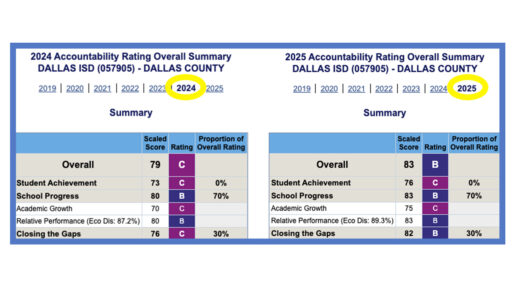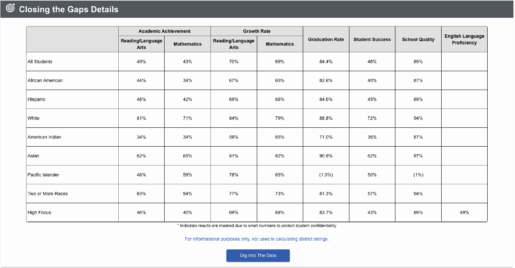Dallas ISD’s student performance has stalled in the C range for two years, according to newly released state data.
The Texas Education Agency (TEA) has released two years of Student Achievement Scores — 2023–2024 and 2024–2025 — providing what many consider the most objective measure of student performance across Texas.
While Dallas ISD’s Overall Accountability Rating improved to a B in 2025, its Student Achievement Score remained in the C range for the second year in a row — 76 in 2024–2025 and 73 in 2023–2024 — low enough that the domain did not factor into the district’s overall score either year.

Achievement Gaps Remain
The TEA’s detailed accountability data shows that only 49% of all Dallas ISD students met grade-level expectations in Reading/Language Arts and 43% in Math in 2025.
Growth rates were notably higher — 70% in Reading and 69% in Math — which helped the district’s School Progress score but did not raise overall proficiency.
The report also highlights differences among student groups.
Some students are achieving at far higher levels than others, while certain groups — often in neighborhoods facing systemic challenges — continue to post lower proficiency rates in both Reading and Math.
Graduation rates also vary, with some groups surpassing 90% and others closer to 70%.
Education leaders say these numbers underscore the need for targeted, community-based solutions that address both in-school learning and the out-of-school factors that affect student readiness.

Dallas Education Collective’s Perspective
Nakia Douglas, Executive Director of the Dallas Education Collective (DEC), said the Student Achievement data reinforces both the urgency and the opportunity to act.
“We congratulate our local school districts on their 2025 accountability ratings. While we celebrate the progress, the Student Achievement data shows there is still significant work ahead, especially when looking at certain student groups. That’s why it’s critical we focus on improving educational outcomes for every child — no matter their ZIP code.”
Douglas noted that many of the students struggling the most academically also face higher barriers outside the classroom — from limited access to early learning opportunities to economic instability.
“If you want to stay informed about what’s happening in education locally and across Texas, we invite you to join us at one of our upcoming DEC convenings: Tuesday, August 26, from 5:30 to 7:00 p.m. at Moorland YMCA at Oak Cliff; Tuesday, September 9, from 5:30 to 7:00 p.m. at Pleasant Oaks Recreation Center; and Tuesday, September 23, from 5:30 to 7:00 p.m. at Park South Family YMCA.”
The Road Ahead
Douglas and other education advocates argue that Student Achievement Scores — because they reflect actual mastery rather than comparative growth — should play a central role in shaping district plans and investments.
With the TEA data now public, the Dallas Education Collective plans to collaborate with educators, policymakers, and community leaders to turn the findings into concrete strategies aimed at lifting proficiency across all student groups.


